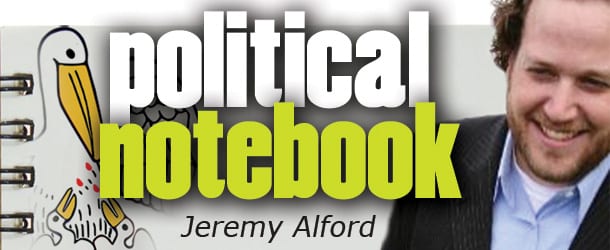The Legislature’s regular session will have to deal with complicated policy proposals and a great sense of political urgency.
Lawmakers have been charged with closing a $440-million budget shortfall for the fiscal year that begins July 1. Gov. John Bel Edwards is also asking the House and Senate to address $1.2 billion in temporary taxes that are scheduled to expire in 2018.
That will mean rapid action and intense debate.
For starters, it appears as if the main budget bill may move more quickly through the process than it did last year.
The House leadership and members of the Appropriations Committee say they’re committed to moving the budget bill to the Senate at or around the midpoint of the session in order to give the upper chamber more time with the document.
During a session that spans just 60 days, the House will have roughly one month, or four weeks, to act on the budget hole.
Conservatives, who hold a majority, believe the shortfall can be made up through cuts only, whereas the governor, and what is probably the lion’s share of the Senate, are open to increasing taxes.
While the larger planks in the governor’s session platform have been released — changes to sales taxes, income taxes and more — there are still a few loose threads; these will be revealed in the coming days and weeks. For example, missing from the governor’s plan was any mention of giving local governments more flexibility to raise revenue. Those in the Edwards administration are talking about how to make this happen, and it could very well be a part of whatever sales tax changes are made.
The governor will likewise be putting his support behind proposals to increase the gas tax and to modify the movie tax credit program. But Edwards did not include either in his official session plan.
Allowing lawmakers to take the lead could help Edwards fade the heat on pushing a tax-heavy agenda.
Frequent Local Tax Votes Questioned
Some lawmakers are concerned that local governments and political subdivisions are abusing the “in cases of emergency” exception in the Louisiana Constitution for submitting tax propositions more than once in a six-month period.
Leading that war cry is House Natural Resources Chairman Stuart Bishop, R-Lafayette, who wants the Legislature to something about the issue.
The worst kind of abusers, said Bishop, are local government entities that fail to gain voter approval for a tax and immediately want another shot on the same exact proposition.
The problem, in the eyes of critics, and according to constitutional law, is that failed tax propositions should only be returned to the ballot — within six months of being rejected — when there’s a local emergency.
“They’ll just bring it back and run it again,” Bishop said. “It’s getting too expensive to run these elections. And taxpayers deserve better treatment.”
Bishop’s HB 41 is a constitutional amendment that would remove the “in cases of emergency” exception.
Even if lawmakers agree to back Bishop’s push, the proposal would still require ratification by Louisiana voters.
Secretary of State Tom Schedler is supporting the legislation. He recently convinced a subcommittee of the state Bond Commission to deny three such local tax propositions.
“When does no mean no?” Schedler asked when contacted about Bishop’s bill.
Maness In Mix For Treasurer
There’s been a name missing from recent lists of potential Republican candidates for treasurer: retired Air Force Col. Rob Maness.
“It’s definitely on my radar, but I haven’t made a final decision yet,” Maness said recently.
If Maness, who has run unsuccessfully for the U.S. Senate twice, gets in, it would further subdivide the GOP vote in a developing field that is dominated by Republicans with no marquee Democratic candidate.
Maness would be doing very few favors for Rep. John Schroder, who needs to keep St. Tammany whole and behind him.
Others who could qualify for the race include state Sen. Neil Riser; state Rep. Julie Stokes; Angele Davis, president of the Davis Kelley Group; and New Orleans attorney Derrick Edwards, the lone Democrat in the field who is new to politics.
Political History: Louisiana’s German-born Governor
On March 4, 1864, a Jewish immigrant from Germany was sworn in as Louisiana’s first Union governor.
George Michael Decker Hahn, known to friends as Michael, settled first with his family in New York City, and then what is now Texas, before moving to New Orleans and graduating from Tulane University with a law degree.
He was elected to the school board in New Orleans at the age of 22. He earned notoriety some years later due to his anti-Confederate stances.
When Union troops took over New Orleans, he became a congressman for the area, and while in Washington became friends with President Abraham Lincoln.
That friendship certainly helped when a special election was called in Louisiana in 1864 and Hahn appeared on the ballot as a candidate for governor — and won.
His agenda was aggressive. He immediately called for a constitutional convention and voting rights for African-Americans.
But Hahn’s big dreams never materialized. Some federal officials refused to recognize his civil government. So Hahn resigned exactly one year after taking his gubernatorial oath to serve in the U.S. Senate. He didn’t have much better luck in D.C., though, where southern senators were blocked from being sworn in after Lincoln’s assassination.
After his run at elected greatness, Hahn’s life changed during the New Orleans Riot of 1866 when he received a gunshot wound that forced him to slow down a bit — but not a lot. He went on to found the town of Hahnville; publish The St. Charles Herald-Guide newspaper, which is still in circulation today; and serve as the superintendent of the U.S. Mint in New Orleans and as a district judge.
He died in 1886 of a ruptured blood vessel.
Oil Lobby Backing Bills
Like most special interests in this state, the Louisiana Oil and Gas Assoc. will be playing defense during the regular session. But LOGA does have two bills on severance taxes it will be putting its weight behind.
HB 516 by Rep. Chris Broadwater, R-Hammond, creates an automatic trigger for well operators to apply for special severance tax rates. Currently, those special rates can only be accessed after the Revenue Dept. makes a determination and documentation is filed.
While the bill does add one new tier for special rates, LOGA vice president Gifford Briggs said his members are only interested in cutting the red tape and bureaucracy and not in changing the thresholds that already exist. “We have companies that should have received these rates, but they got bogged down in the paperwork and the bureaucratic process,” he said.
HB 461 by Rep. Stuart Bishop, R-Lafayette, is also being backed by LOGA. Briggs said it would “improve” the severance tax exemption for inactive wells. That means taking it from a 100-percent tax exemption for five years to a 50-percent tax exemption for 10 years.
The bill likewise adds a new exemption for production from an orphan well that provides a 75-percent rate reduction for 10 years, as long as it has been in the orphan well program for five years.
For more Louisiana political news, visit www.LaPolitics.com or follow Jeremy Alford on Twitter @LaPoliticsNow.














Comments are closed.